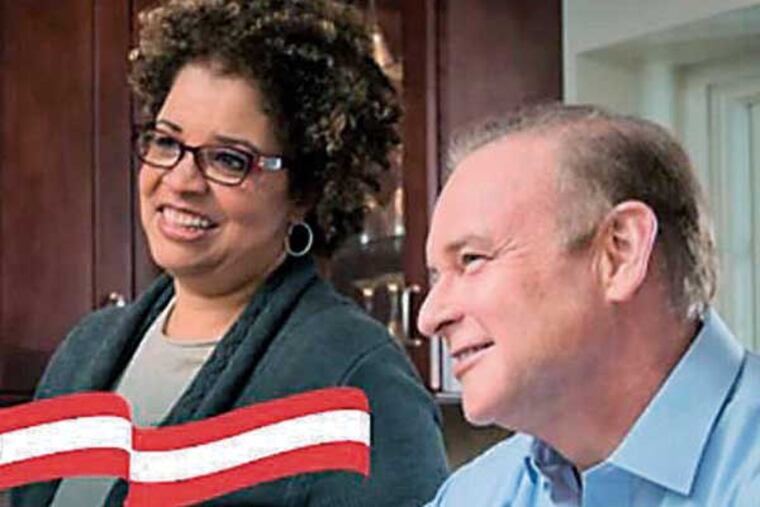For white Pa. politicos, is black the new black?
A new trump has been played in Pennsylvania's Democratic primary - call it the reverse race card. State Treasurer Rob McCord threw it down in the governor's campaign, in debates and television ads, attacking Democratic frontrunner Tom Wolf for not more swiftly (and publicly) cutting ties in 2001 to a York mayor accused of a racial killing three decades before.

A new trump has been played in Pennsylvania's Democratic primary - call it the reverse race card.
State Treasurer Rob McCord threw it down in the governor's campaign, in debates and television ads, attacking Democratic frontrunner Tom Wolf for not more swiftly (and publicly) cutting ties in 2001 to a York mayor accused of a racial killing three decades before.
McCord also ran ads showcasing his African American wife, Leigh Jackson, telling viewers that her white husband sees and hears "people who are often invisible."
Wolf's campaign swiftly put up rebuttal spots - one featuring Kim Bracey, York's current mayor and the first black person to win that post; another, answering criticism of his business practices, liberally featuring African American employees, including a top executive.
It's quite a switch from the usual meaning of race card - referring to white politicians exploiting racial fears and resentments to stir up anti-black votes, such as the infamous Willie Horton campaign ad in 1988. Instead, strategists say, the intent of the reversal is to stimulate turnout among African American and liberal voters.
It may have worked last year in New York City, where analysts say white Democrat Bill De Blasio's election as mayor was in part the result of a TV ad featuring his biracial teenage son.
As Tuesday's Pennsylvania primary nears, U.S. Rep. Allyson Y. Schwartz has emphasized her service in the cabinet of W. Wilson Goode, Philadelphia's first African American mayor. Katie McGinty, the former state environmental secretary who also is seeking the Democratic nomination, has recalled the discrimination faced by her dark-skinned adopted twin girls from India.
Even Gov. Corbett, a Republican, has dabbled in the tactic, with a new TV ad showing him with his mixed-race grandchild.
So is this the norm across the country - for white politicos, is black the new black?
"Absolutely not," said David Bositis, a longtime Washington scholar on race in politics. "Pennsylvania is fairly unique in this cycle as one of the few states where Democrats are playing offense. . . . In the primary, any candidate who can get an edge with black voters is in an advantageous position."
Pollster G. Terry Madonna of Franklin and Marshall College said African Americans, a traditional mainstay of the Democratic coalition, can constitute up to 20 percent of voters in a primary, higher than their share of the population. Yet midterm election turnout, particularly among minority and young voters, tends to drop below participation rates in presidential years.
McCord says he raised the race issue for the right reasons, but Madonna said it also "is a play on a turnout model - that this would galvanize a lot of liberals and African Americans, especially in the vote-rich southeast."
Franklin and Marshall's latest poll, released Wednesday, suggests it may not be paying off. The percentage of registered Democrats who view him negatively was 14 percent, up from 2 percent in the college's March poll - the biggest increase among the four candidates. Twenty-one percent said they had a positive view of McCord.
Wolf's negative rating was 12 percent in the new poll, compared with 49 percent who viewed him positively.
In addition, the poll found McCord had the support of just 9 percent of nonwhite Democrats, compared with 13 percent for Schwartz and 36 for Wolf. (The May 6-12 survey of 530 registered Democrats had a margin of error of plus or minus 4.3 percentage points.)
"For an attack to be effective, it has to have a credible underlying basis and be at the forefront of voters' concerns," Madonna said. This is "not something voters have bought into."
In 1988, Republicans used the imagery of Horton to portray the Democratic presidential nominee, Massachusetts Gov. Michael S. Dukakis, as soft on crime.
A murderer serving life without parole in Massachusetts, Horton was released in 1986 on a weekend furlough program - which Dukakis had supported - only to be arrested later for twice raping a Maryland woman after pistol-whipping her fiance.
"By the time we're finished, they're going to wonder if Willie Horton is Dukakis' running mate," George H.W. Bush's campaign manager, Lee Atwater, said at the time. Bush won in a landslide.
In recent weeks, top Democrats such as former Gov. Ed Rendell and U.S. Sen. Robert P. Casey have publicly labeled as unfair McCord's critique of Wolf's role in the 2001 York mayor's race. McCord has disagreed - while acknowledging that talking about race is not always popular or politically advantageous.
"People have an allergic reaction when you bring up race issues," he said Monday in a Drexel University debate, televised statewide. "At a very personal level, I understand this." But, McCord said, leaders should be able to confront racism without being accused of "playing the race card," a charge that cuts off debate.
"Listen, this isn't a game to me," McCord said. "I'm not playing a game here."
Wolf says he was instrumental in pushing Mayor Charlie Robertson to exit the 2001 primary race after Robertson was charged as an accessory to the slaying of an African American woman in the city's 1969 race riots. Robertson was acquitted.
"I stayed in the campaign for the two or three days it took to get him out of the race," Wolf said in the Drexel debate. "That was the sum total of my connection."
As for the Horton ad, considered among the most virulent modern examples of the old-school race card, Atwater had a change of heart as he was dying of brain cancer in 1991. In a Life magazine essay, he apologized to Dukakis.
215-854-2718
@tomfitzgerald